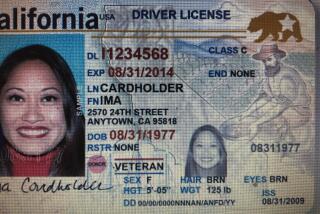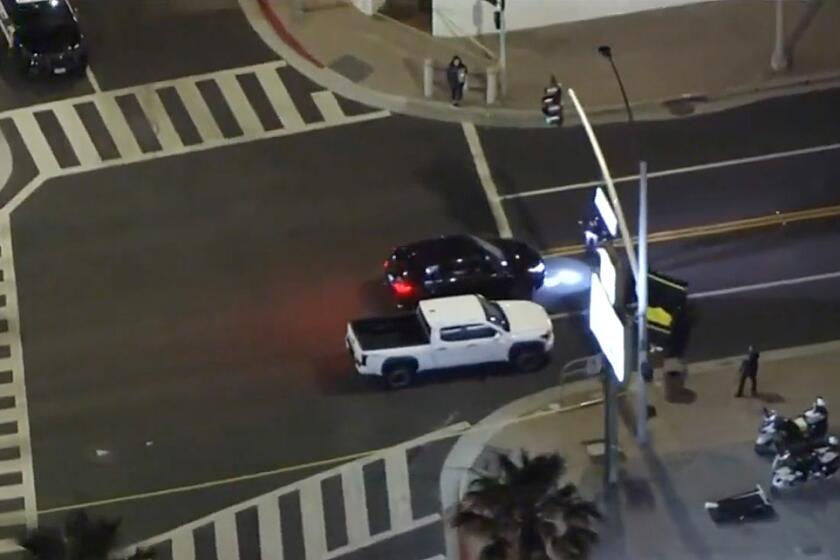Relationship of Detective, Informant at Issue in Drug Case : Courts: Officer had sex with dealer’s girlfriend, she says in affidavit. The statement is introduced in an effort to overturn the convicted man’s 24-year sentence.
A Beverly Hills detective was involved in a sexual relationship with the girlfriend of a drug dealer when he had the dealer arrested in 1990, according to an affidavit filed in U.S. District Court.
The girlfriend, Lynne D’Andrea, made the assertion in a sworn affidavit introduced as part of an effort to overturn the conviction of Michael D. Christakis, serving a 24-year sentence for conspiring to sell large amounts of cocaine.
In her statement, D’Andrea said the detective, Richard King, paid her for information in early 1989.
“After some time, a mutual sexual attraction developed,” D’Andrea said. “Rick (King) followed me back to my apartment. . . . Rick and I proceeded to my bed where we had sexual relations.”
Judge Edward Rafeedie on Monday denied a motion that lawyers be given the opportunity to question King on D’Andrea’s assertions, but prosecutors said they will forward her statement to the FBI and Beverly Hills Police Department for review.
King was a 15-year veteran of the Beverly Hills department when he was fired a few months ago in an unrelated matter, said Lt. Jim Smith, the department’s detective commander. Smith refused to elaborate on why King was dismissed but added that the former detective is asking for reinstatement.
Told of D’Andrea’s sworn statement, Smith warned that none of her charges have been proven. But he also said that it appears from the affidavit that King may have acted improperly. “When an officer meets with an informant, we usually require that another officer be present,” Smith said.
King could not be reached for comment.
Smith said he was not sure what action would be taken in King’s case, but that the department usually launches an internal inquiry when allegations such as D’Andrea’s are raised. He said it will be up to the chief of police to decide whether an investigation is warranted.
Other law enforcement experts said that having a sexual relationship with an informant--especially one who has a personal relationship with a suspect--violates basic police practices and usually results in disciplinary action against an officer.
“The (Drug Enforcement Administration’s) policy is that all contacts with informants must be professional in nature,” said DEA spokesman Ralph B. Lochridge. Inappropriate contact with informants can be punished with unpaid suspensions or firing, he added.
An FBI representative said that the agency’s rules are similar and violating them could result in administrative action against an agent.
Officials at those agencies and at the Beverly Hills Police Department said an officer’s credibility can be questioned when he or she has a personal relationship with an informant.
Police received permission to tap Christakis’ phone based largely on King’s statements that he was unable to obtain information for the investigation any other way.
Victor Sherman, Christakis’ lawyer, argued that D’Andrea’s claim that she had a sexual relationship with King--and the fact that they did not disclose it--undermines King’s credibility and suggests that information from the wiretap should not have been allowed as evidence. Without that evidence, the government had no case against Christakis, Sherman said. Rafeedie said that Sherman and the government’s lawyer had the opportunity during a previous court hearing to ask D’Andrea about her relationship with the officer.
In rejecting Sherman’s request for the hearing to take testimony from King, the judge said King and D’Andrea had acknowledged that their relationship was “friendly” but lawyers had not pressed them for details.
More to Read
Start your day right
Sign up for Essential California for news, features and recommendations from the L.A. Times and beyond in your inbox six days a week.
You may occasionally receive promotional content from the Los Angeles Times.







